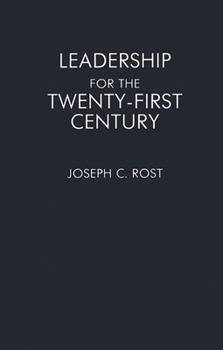Leadership for the Twenty-First Century
Select Format
Select Condition 
Book Overview
This illuminating study critiques the concept of leadership as understood in the last 75 years and looks to the twenty-first century for a reconstructed understanding of leadership in the postindustrial era. More similarities in past decades were found than had been thought; the thread throughout Rost's book is that leadership was conceived of as good management. He develops a new definition and paradigm for leadership in this volume that distinguishes...
Format:Paperback
Language:English
ISBN:027594610X
ISBN13:9780275946104
Release Date:February 1993
Publisher:Praeger
Length:240 Pages
Weight:0.86 lbs.
Dimensions:0.6" x 6.0" x 9.0"
Customer Reviews
4 ratings
The Corporate University Handbook
Published by Thriftbooks.com User , 15 years ago
The Corporate University is a [must have] for practitioners, graduate students, consultants and trainers. The use of explict language, practical learning constructs, and excellent examples makes this book stand out among the top T & D manuals.
The Best Leadership Text
Published by Thriftbooks.com User , 16 years ago
The undergraduate or doctoral student studying leadership, if limited to purchasing one book, should buy this treatise. Rost's book is unquestionably the best analysis of leadership available.
Classic leadership text
Published by Thriftbooks.com User , 18 years ago
Rost was a theorist and teacher who started the leadership studies program at the University of San Diego. His understanding of the literature is exhaustive, and in this work he analyzes most of the work on leadership written between 1930 and 1990. His book is intended for serious academic students of leadership who are troubled by the lack of a clear definition of what "leadership studies" is or constitutes. After reviewing the literature, Rost concluded that the 20th century was dominated by what he called an "industrial paradigm" that defined leadership as "good management" (p. 94). This explanation provided coherence to an otherwise confusing array of leadership theories like the "great man," traits, situational, and so forth, which, Rost contended, described management but not leadership. His 21st century definition, which he labeled the "post-industrial paradigm," defined leadership as "an influence relationship among leaders and followers who intend real changes that reflect their mutual purposes" (p. 102). This is contrasted by his definition of management as "an authority relationship between at least one manager and one subordinate who coordinate their activities to produce and sell particular goods and/or services" (p. 145). Rost's work has great importance in the field of leadership studies if the field is going to be a social science that conducts research in a positivist tradition. Rost's distinction between the definitions of leadership and management (quoted above) is his key contribution to the field, which he summarized in the following table in order to highlight the contrasting elements in each (p.149): LEADERSHIP MANAGEMENT Influence relationship Authority relationship Leaders and followers Managers and subordinates Intend real changes Produce and sell goods/services Intended changes reflect mutual purposes Goods/services result from coordinated activities Leadership for the 21st Century is important for students of servant leadership because Rost draws a clear line of demarcation between those who engage in leader-follower relationship processes through influence--leaders--and those who use organizational or personal power to achieve compliance through coercive authority that is "perfectly acceptable to both managers and subordinates" (p. 146)--managers. Although compliance is a necessary feature of most organizations, coercion is antithetical to servant leadership. Rost summarized what he saw as the two key differences between leadership and management this way. These distinctions harmonize with the general thrust of servant leadership as a transformational rather than transactional leadership style (Burns, 1978). The difference is that leadership is an influence relationship and management is an authority relationship. The differences in these two kinds of relationships have to do with (1) use of coercion and (2) directionality
Leadership scholars & practitioners must read!
Published by Thriftbooks.com User , 25 years ago
As a scholar and practitioner of leadership, I was a student of Joe Rost for several years at the University of San Diego. I had the luxury of being in the author's class on leadership -- and was guided, painfully at times, down the path of knowledge, toward the light of understanding. We were required to read several other "leadership" books, many of which have received high marks from outside readers on their "readability" -- and, inversely, low marks from those of us in Rost's class that understood their purposful seduction away from scholarly understanding toward a "feel good" or "cook book" approach so many other authors have used (quite successfully though) do no justice to our desire for understanding.What's the point? Read this book if you dare to try and understand the depth and complexity of leadership studies. It is a ride that requires one to put away ALL preconceptions of what one may believe leadership is... as Einstein is often quoted as saying, "... one may not solve a problem from the same consciousness that created it."Open your mind... open this book -- READ. It is a true seminal work on leadership, one to place along side of MacGregor Burns' "Leadership".





